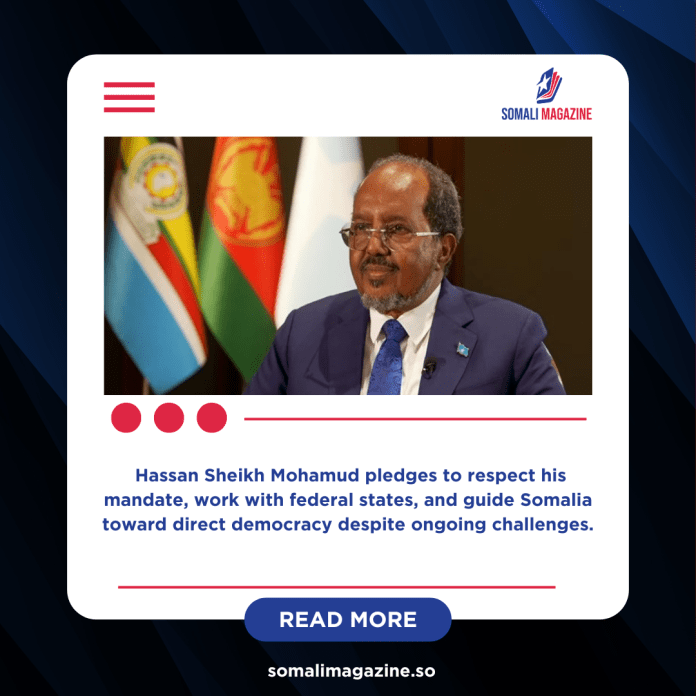Facebook Twitter (X) Instagram Somali Magazine - People's Magazine
Somali President Hassan Sheikh Mohamud has assured the public that he will not extend his time in office beyond the four years granted by his mandate. Speaking in an interview with the BBC on Wednesday, the president emphasized that national elections will be held on schedule and that he intends to respect the constitutional timeframe. Mohamud was elected on May 15, 2022, and he stated firmly that his term will end on May 15, 2026.
“I was elected on May 15, 2022, and my term ends on May 15, 2026,” Mohamud said during the interview. He explained that his goal is to hold elections within that period. At the same time, he added that he has not made promises about what might come after his current mandate, leaving the future open. However, he gave reassurance that if he loses the vote, he is prepared to step down peacefully and transfer power without resistance.
This statement comes at a critical time in Somalia’s political journey, as the country continues to face internal challenges and uncertainty. Many Somalis remain concerned about whether leaders will honor constitutional timelines, especially given the history of election delays and disputes in the country. Mohamud’s words are therefore seen as a crucial message of stability and commitment to democratic processes.
The president admitted that there are tensions between the federal government in Mogadishu and some of Somalia’s regional member states. These disagreements have sometimes disrupted political cooperation and slowed down progress. Still, Mohamud expressed confidence that these disputes can be resolved, stressing that communication, even when indirect, has continued. He added that his government has already made compromises in order to strengthen ties with the federal states.
According to Mohamud, his administration is particularly focused on engaging Puntland and Jubbaland, two regional states that have often found themselves at odds with Mogadishu. Bringing them back to the negotiating table is seen as a vital step toward organizing elections that are inclusive and accepted across the country. He argued that without the participation of all states, Somalia risks deepening divisions and weakening national unity.
One of the president’s long-term goals is to move Somalia closer to a one-person, one-vote election system. Currently, Somalia operates under a complex indirect voting model, where clan elders and delegates play a central role in selecting representatives. This system has often been criticized as undemocratic and vulnerable to manipulation. Mohamud emphasized that his government is committed to making progress toward direct elections, though he acknowledged that achieving such a milestone will take time and require extensive preparation.
He also underlined the importance of completing Somalia’s provisional constitution, which has been in place since 2012 but remains unfinished. Finalizing the constitution, he said, is essential for building a stronger state and ensuring that all political processes are guided by a clear legal framework. Without it, Somalia risks continued disputes and uncertainty every election cycle.
Despite his optimism, Mohamud did not shy away from highlighting the difficult reality Somalia faces. The country is still struggling with insecurity, particularly from the extremist group al-Shabab, which continues to launch deadly attacks against civilians, security forces, and government institutions. At the same time, political rivalries among leaders of the federal states and the central government threaten to undermine unity and progress.
Even with these challenges, the president insisted that his government is determined to keep Somalia on the path to stability and democratic governance. He explained that building reliable institutions that can deliver free and fair elections is not just a political priority, but also a responsibility to the Somali people who have endured decades of conflict and instability.
For many observers, Mohamud’s remarks provide reassurance that Somalia’s leadership is willing to respect democratic norms. However, the true test will come in the years ahead, as the government works to balance competing political interests, confront insecurity, and prepare for what could be Somalia’s most significant elections in recent history.
For families who once spent endless time and effort looking for water and pasture, often with little reward, this model has brought new stability. It has turned uncertainty into a source of steady income, helping them cope with drought while keeping their traditional way of life alive.

